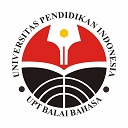EFEKTIVITAS MODEL PEMBELAJARAN KOOPERATIF TIPE MAKE A MATCH DALAM PENGUASAAN JOSUUSHI BAHASA JEPANG
Abstract
Dalam pembelajaran bahasa Jepang, kosakata merupakan aspek penting yang harus dikuasai guna menunjang kelancaran dalam berkomunikasi baik secara lisan maupun tulisan. Namun dalam proses pembelajaran bahasa Jepang di sekolah, banyak peserta didik yang masih kesulitan dalam menguasai kosakata. Salah satunya adalah kata bantu bilangan (josuushi). Untuk itu dibutuhkan model pembelajaran yang tepat agar tujuan pembelajaran dapat tercapai dengan baik. Salah satunya dengan model pembelajaran kooperatif tipe make a match. Penelitian ini bertujuan untuk mengetahui efektivitas model pembelajaran kooperatif tipe make a match dalam penguasaan josuushi bahasa Jepang. Metode yang digunakan dalam penelitian ini adalah metode eksperimen murni dengan desain penelitian control group pretest-posttest. Sampelnya adalah 66 orang peserta didik SMA Negeri 1 Parongpong tahun ajaran 2016/2017. Dengan masing-masing 34 orang untuk kelas eksperimen dan 32 orang untuk kelas kontrol. Instrumen yang digunakan adalah tes dan angket. Dari hasil analisis data, nilai rata-rata kelas eksperimen sebelum diberikan perlakuan sebesar 25,18 dan setelah diberikan perlakuan diperoleh nilai 81,32. Dengan thitung sebesar 9,3, db = 64 pada taraf signifikasi 2,00 (5%) dan 2,65 (1%). Karena thitung lebih besar dari ttabel, maka hipotesis kerja dalam penelitian diterima bahwa model pembelajaran kooperatif tipe make a match efektif dalam meningkatkan penguasaan josuushi bahasa Jepang. Berdasarkan hasil angket, dapat disimpulkan bahwa lebih dari setengahnya responden berpendapat bahwa model make a match ini menarik dan membantu dalam proses pembelajaran josuushi bahasa Jepang.
In learning Japanese Language, vocabulary is an important aspect that has to be mastered to assist in the fluency of verbal and non-verbal communication. However, in the process of learning Japanese language at school, there are a large number of pupils who still find that learning vocabulary is difficult. For instance is learning the auxiliary number (josuushi). Therefore, the proper learning model is needed to achieve the goal in learning process, such as make a match type learning model. This research aims to understand the effectiveness of cooperative learning model of make a match type in learning Josuushi of Japanese language. The writer used true experimental method with control group pretest-posttest as a research design. The sample of the research consists of 66 students of SMA Negeri 1 Parongpong period of 2016/2017, where 34 of them are for experiment class and 32 for control class. The instruments of the research are test and questionnaire. From the result of the data analysis, the average score of experiment class before the treatment is 25,18 and changed becoming 81,32 after the treatment. With tscore was 9,3 db = 64 in signification degree of 2,00 (5%) and 2,65 (1%). Since the tscore was bigger than ttable, thus the hypothesis is accepted that the cooperative learning model of make a match type is effective in increasing the mastery of josuushi. Based on the result of questionnaire, the writer concluded that more than half of respondents have a thought that make a match type is interesting and helping in josuushi learning process.
Keywords
Full Text:
PDFRefbacks
- There are currently no refbacks.

This work is licensed under a Creative Commons Attribution-NonCommercial-ShareAlike 4.0 International License.
Published by:
Department of Japanese Language Education
Faculty of Language and Literature Education
Universitas Pendidikan Indonesia

e-ISSN: 2598-1250 p-ISSN: 2598-1234


